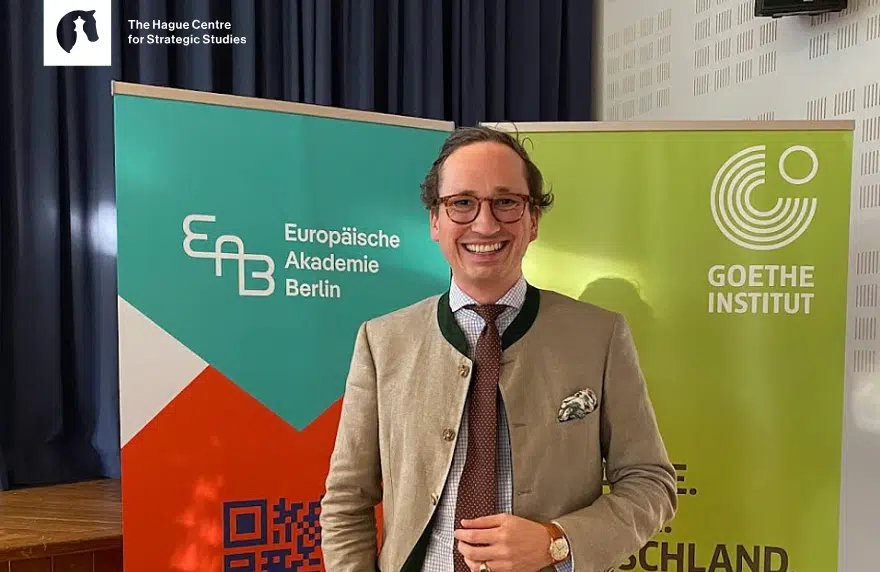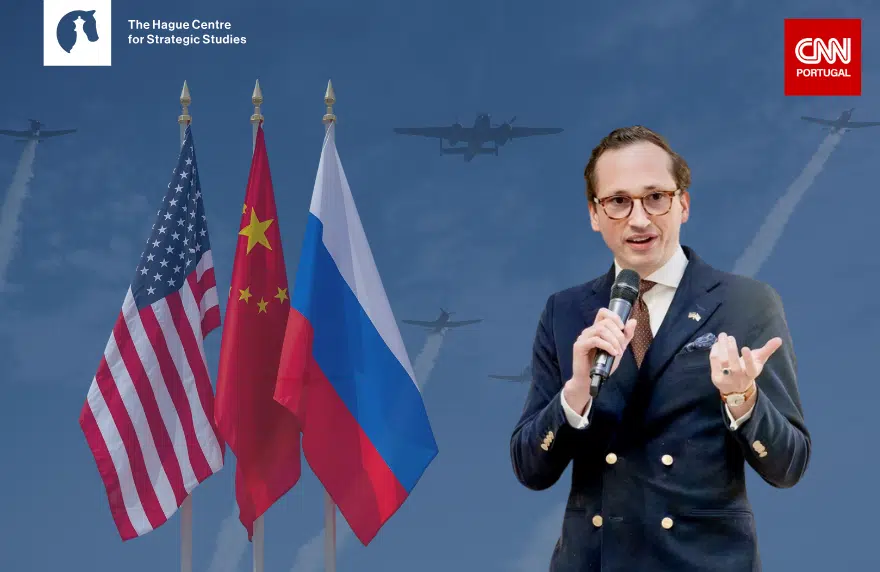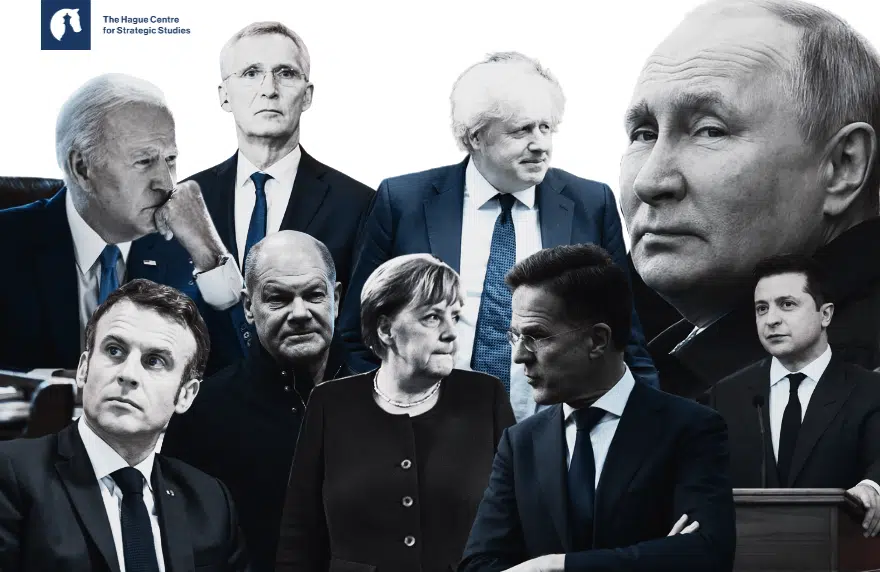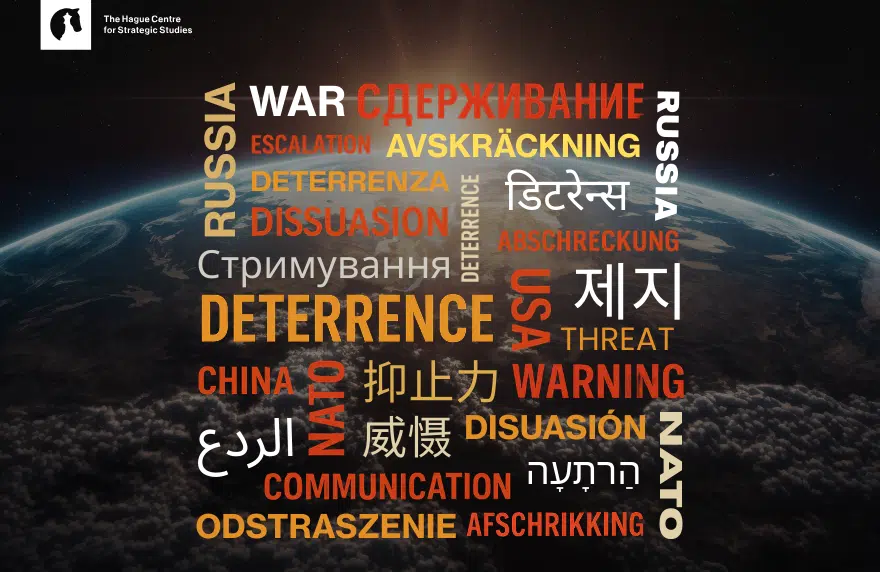Markus Iven, a German analyst at The Hague Centre for Strategic Studies, came to Lisbon for a seminar at the Goethe Institute organized by the European Academy in Berlin and the German embassy.
Russia is the biggest threat to Europe. And after Ukraine, with its accumulated military experience and full-fledged weapons production, will it be even more dangerous?
Russia is waging a war against Ukraine, but that’s not the only thing it’s after. The Russian economy has shifted to a war economy; it produces munitions and weapons in large quantities, such as tanks and cruise missiles, more than needed for the war in Ukraine. Much of their production is now focused on replenishing their military reserves. Why would they do that? They want to deter NATO members first and foremost, but they will also look for any weakness that, especially European allies, might show. The moment we are weak, disunited, and unprepared, they will certainly exploit that. And the greatest risk is for those close to the Russian Federation. The Baltic countries, but also Poland, Romania, and Bulgaria, are the most threatened.
Russia is also waging a hybrid war in Europe. It’s part of the strategy: do they want European countries to fear more for their own security and be less concerned about the security of Ukraine?
What we’ve seen since 2022 is a massive increase in what could be called a hybrid war waged by the Russians against Europe. We see attacks on our critical underwater infrastructure, namely the submarine cables that are crucial for information transmission and our economy. Now we also see drone incursions, airspace violations, and this is a new level. Why is Russia doing this? There are several hypotheses. One is that they are testing European air defences. How quickly can NATO get planes in the air to intercept them and remove them from an ally’s airspace? Or how vulnerable are our underwater infrastructure, our ports? These explanations are not convincing. With each airspace intrusion, the attacked countries improve their defence capabilities. NATO allies’ preparedness increases. Therefore, this cannot be Russia’s true logic.
The second hypothesis is that Russia is preparing for a large-scale war against NATO, and now they are already trying to weaken our logistical capabilities needed for defence. This also cannot be the real reason, because if it were, they would concentrate on infrastructure that is truly critical to the war effort. For example, we haven’t yet seen attacks of strategic consequence on ports, military bases, and other logistical infrastructure. So, what is the real motive? The real reason is that Russia wants to divert attention from the war in Ukraine, because this is seen by the Russians as their highest priority. The survival of the regime is, to some extent, linked to the war in Ukraine. And if Russia loses the war, what will happen to its economy? Russia is operating as a war economy. It’s not easy to return to what it was in peacetime. The moment they do, we would see that the Russian economy is no longer competitive. As long as they continue to produce weapons and ammunition, the Russian people will not feel that they are actually in stagflation or even recession.
When they carry out hybrid attacks in Europe, whether in Germany, Portugal, or Italy, they want to divert the attention of politicians and the population. Politicians and the military then feel that they must concentrate on national defence. An irregular or hybrid war is the strategy of the weaker side. Therefore, the Russians feel that NATO is strong enough to deter them. They don’t think they can win a war against all of NATO while fighting in Ukraine, with little success, I might add. In this way, the most useful thing they can do is irritate us. If they divert our attention with attacks all over Europe, people will ask: what is the government doing to protect us? Russia has a significant advantage; hybrid attacks cost them a minimal amount of money to find a new weakness. Conversely, it costs us an enormous amount to defend against everything, to be resilient everywhere. It’s an impossible task, but if we try to do it, we automatically divert our attention from Ukraine because we only have a limited amount of resources. The more we spend on our own defence, the fewer resources we’ll have to support Ukraine. That’s the real objective behind these attacks. The worst thing we could do is not see that it’s a trap the Russians are setting.
The bar is now set at 5% of defence spending within NATO, or at least 3.5%. But when we talk about spending more in the EU, we are primarily talking about buying more from the US. What does it take for Europe to be self-sufficient in defence?
Both NATO and the EU are necessary for European defence. And we shouldn’t say that one is more important than the other. NATO is far more experienced in security and has the necessary command structure to defend Europe. The EU wouldn’t be able to do it. However, European nations need to provide the capabilities so that NATO’s command structure has sufficient troops to defend Europe. And there’s a significant delay so far. Most of the capabilities needed for defence against Russia are ensured by the US, especially in what, in military terminology, we call intelligence, surveillance, and reconnaissance. For example: Europe has about 50 military satellites. The US has about 250. Can we put another 200 military satellites into orbit in the next five years? That seems unrealistic.
Considering our history, values, and shared interests, it makes sense to try to preserve this link and show the Americans that, as Europeans, we are getting involved, taking on more responsibility for our own defence. Polish Prime Minister Donald Tusk rightly pointed out the absurdity of 500 million Europeans asking 300 million Americans to protect them from 140 million Russians. By showing that we are good allies, Europe needs to make the United States understand that we will need them, at least these crucial capabilities, for the next ten years.
This does not prevent the EU from assuming a much larger role, consolidating our defence industries, which are very fragmented. When we talk about major weapons systems, which would be a frigate, a fighter jet, a tank or an artillery system, in Europe, according to some calculations, we have 178 different systems compared to the US, with only 30. This has historical reasons. In the past, the US also had more systems, ,and there we saw a consolidation of its industry. That is what we need to do now. Europeans have to buy together. We don’t need 12 different tanks, it would be good to have only a few. And this applies to all systems.
The problem is that, when we think about the enormous amounts of money we have to spend on defence, nations always want the profits and jobs to be in their own countries, so that this money at least pays off somewhat. According to a recent Politico article, Germany will acquire weaponry worth €377 billion in the coming years, and even with a GDP of €4.3 trillion, these figures are enormous. The central problem is that deterrence is something abstract. We will only feel we are at war when it is too late.
Donald Rumsfeld wisely said: “ You go to war with the army you have, not the army you might want or wish to have at a later time.” Building capable armed forces takes years or even decades. So how do we solve this? Europe needs to combine its military industry as much as possible, creating great European champions that can compete with American industry.
At the same time, we need to invest in European capabilities for our defence. Finally, and most importantly: we need to support Ukraine. The best thing we can do now is work together with our American allies and buy ammunition from them for our stockpiles and weapons systems. And, generally speaking, the US will favour strengthening the European military-industrial base because, if they become involved in a conflict in Asia in the future, they will not be able to supply us with ammunition and weapons. And they will need our support, just as they give it to us now.
Support for Ukraine, he says, cost nine euros per European per month in 2024. But when talking about targets of 3.5% or 5%, explaining to civil society the need to increase defence spending is one of the biggest challenges for leaders, who are faced with concerns about the repercussions on investment in health or education.
Since the beginning of the large-scale invasion, both Europe and the US have spent between 40 and 50 billion dollars annually in macroeconomic and military aid to support Ukraine. Now, in 2025, the Europeans are practically alone. European support is a lifeline for Ukraine. If we don’t spend this money, Ukraine will have no possibility of surviving as a sovereign nation, which is crucial for us Europeans. A sovereign Ukraine is Europe’s first line of defence.
If anyone thinks that Russia will stop after winning the war in Ukraine, I would be very sceptical. I remember they said the same thing in 2014, after Crimea. And before 2022, we heard that it wouldn’t be rational for the Russians to attack. Why would they? But they did. Everyone who now says, “I don’t believe it’s rational for them to attack a NATO state,” I would be very cautious. First of all, they did it recently with their drone strikes –and that was just the beginning.
Secondly, the moment the Russians see a vulnerability –and that would be somewhere in the east, our eastern allies, where small states like the Baltic countries are very exposed, given their very small population. Together, the Baltic states have about six million inhabitants, compared to 140 million in Russia. And considering that Russia has always had compulsory military service, it can mobilize a huge force if it really wants . And yes, technology is important in war, but you always need people to operate tanks and fighter jets.
Returning to the question, the security of Europe is being defended now, not only by our NATO allies, but also in Ukraine. What this means is that Ukraine must not lose the war, whatever the cost. It must remain a sovereign nation. Therefore, if Portugal and Germany value NATO and the EU, their fate will be decided in Eastern Europe. The moment a NATO or EU country is attacked, it calls into question the entire idea of Europe. It’s one for all and all for one. And nine euros a month for support to Ukraine is little more than what you pay in The Hague for a cappuccino and a croissant.
Markus is German and served 14 years in the German armed forces. In his speech, he said that Germany was a “sleeping beauty” until three years ago. Now it is rearming. The common enemy has put an end to the distrust that existed, and do we need a strong Germany more than ever in Europe?
Germany plays a fundamental role in NATO and the EU because it is located in the heart of Europe. Therefore, we must be the link between Western Europe and Central and Eastern Europe. What does this mean for Germany? First, we will be, along with the Netherlands and Belgium, one of the main logistical transport hubs for supplies from Western Europe and the US to Central and Eastern Europe. But at the same time, the smaller nations of the east will need the support of the middle powers – Germany, Italy, France, and the United Kingdom. But every ally counts.
Consequently, we need to invest more in forward defence; this means having a large part of our armed forces outside our home country, especially in Eastern Europe, where they would really make a difference. Germany has started this now, with the formation of a brigade of about 5,000 soldiers in Lithuania. Germany has a great responsibility for Lithuania, as it is located at a critical geographical point between Kaliningrad and Belarus. But it is also making efforts in other areas. Germany will reach 3.5% of GDP for defence as early as 2029, because we see that the window of opportunity Russia has to attack a NATO country exists well before 2035. And considering that buying and storing ammunition, as well as the major weapons system, takes a long time, we need to start now. Later will be too late.
Therefore, Germany is mobilizing and assuming responsibility for Central and Eastern Europe in a historic way. This has, until now, been strongly encouraged by Eastern Europe. The Polish Foreign Minister, Radoslaw Sikorski, already said in 2011, “I fear German power less than German inaction.” Germany is no longer the sleeping beauty of Europe. This shows how much perceptions, not only in Germany but throughout Europe, have changed in the last decade, and especially since 2022.






